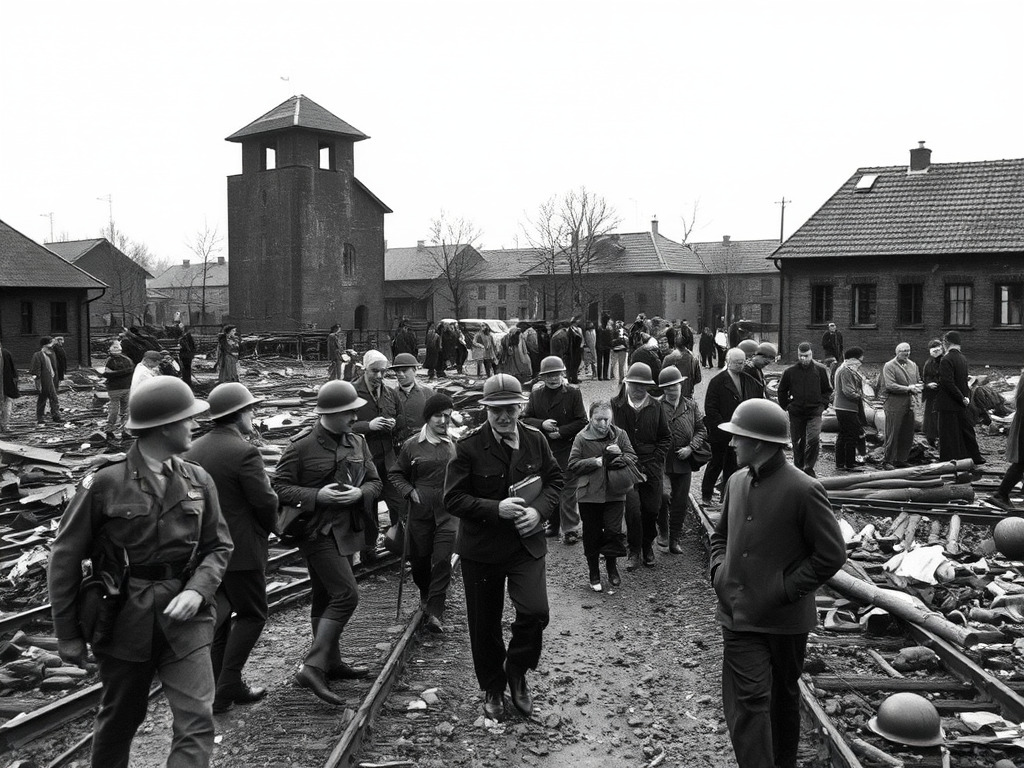Introduction
On January 27, 2025, the world observed Auschwitz’s liberation’s 80th anniversary. Germany profoundly reflected on its history and Holocaust remembrance. Auschwitz remains a haunting symbol of genocide. This anniversary prompted an examination of Germany’s memory culture and ongoing efforts to ensure the Holocaust’s lessons resonate with future generations. Germany confronts its Nazi past with a commitment to remembrance and education. This links historical acknowledgment with contemporary society to promote sensitivity and tolerance. This underscores memory culture’s role in national identity. The rise of anti-Semitism and hate crimes across Europe underscores the urgency for effective remembrance.

Latest Developments
Understanding Memory Culture in Germany
Germany’s commitment underpins its memory culture. It acknowledges past horrors and honors victims. After World War II, Germany collectively tackled the Nazi regime’s aftermath. Germany made significant efforts. Germany established institutions like the Memorial to the Murdered Jews of Europe in Berlin. These institutions serve as powerful reminders. They also aid reflection and education. These places are essential to Germany’s ongoing reconciliation. Germany remembers its history and confronts it. These places provide a platform for this process. Germany believes such horrors must never recur. Germany created memorials, museums, and education programs. These highlight a national consensus against past horrors. Institutions such as the Memorial to the Murdered Jews of Europe in Berlin are critical. They serve as reminders and spaces for reflection and education. They play an essential role in Germany’s ongoing reconciliation. Germany reconciles with its past through these institutions.
The Role of Public Memory
Germany does not contain the public memory of Auschwitz and the Holocaust. Global collaborations, such as partnerships with worldwide Holocaust memorial organizations, facilitate knowledge exchange and educational programming. Global commemorative events, like International Holocaust Remembrance Day on January 27, build a united front against anti-Semitism. This international dimension enhances the understanding of Holocaust remembrance’s importance. It honors victims and combats hatred and discrimination. It emphasizes nations’ shared responsibility in fighting prejudice.

Future Outlook
Predictions for Memory Culture Evolution in Germany. Change will continue. Germany’s evolving memory culture adapts to societal challenges. Holocaust survivors are passing away. Germany increasingly relies on educational programs and digital media. They work together to preserve survivor stories. Virtual reality, interactive documentaries, and augmented reality experiences are emerging. These are important for future generations learning about the Holocaust in new ways. A noticeable shift in how future generations engage with Holocaust education is evident.
Expectations for Evolution of Culture Memory in Germany
We now consider prospects for Germany’s evolving memory culture. Germany made collective efforts after World War II to confront the Nazi regime’s consequences. Germany built memorials, established museums, and developed educational programs. These reflected a consensus to prevent similar horrors. Institutions like the Berlin Memorial to the Murdered Jews of Europe serve as critical reminders. They also function as spaces for reflection and education.
These sites are crucial to Germany’s ongoing reconciliation with its past. Germany does not forget its history; it confronts and learns from it. Germany prevents the repetition of past horrors. German schools integrate Holocaust education to ensure students learn about Auschwitz and the broader context of Nazi atrocities. Germany updates teaching materials and trains educators.
These changes aim to provide youth with a comprehensive understanding of the Holocaust’s moral and ethical implications. Professor Claudia Bär, an education expert, notes a critical juncture. The survivor experience is fading. Germany must transform survivor stories into lessons for today’s youth. Virtual reality experiences and immersive workshops are gaining popularity. They aim to provide students with engaging ways to explore this dark chapter in history.
Addressing Rising Anti-Semitism
Despite extensive efforts to combat hate, Germany faces a concerning rise in anti-Semitic incidents. The Federal Office for Protection of Constitution reports a 14% increase in anti-Semitic crimes in 2023 alone. This trend sparks conversations about the effectiveness of remembrance and education initiatives. Community leaders advocate for stronger legal measures against hate speech and anti-Semitism.
Background and Context
Understanding Memory Culture in Germany
Germany’s Holocaust memory culture stems from its dedication. It acknowledges past atrocities and honors victims. After World War II, Germany collectively confronted the Nazi regime’s consequences. Germany established memorials, museums, and educational programs. Germany agreed that such horrors must never be repeated. Institutions like the Memorial to the Murdered Jews of Europe in Berlin serve as significant reminders. They also provide spaces for reflection and education.
Public Memory Role
Germany does not solely hold the public memory of Auschwitz and the Holocaust. International collaborations, including partnerships with worldwide Holocaust memorial organizations, foster knowledge exchange and educational programs. Global commemorative events, such as International Holocaust Remembrance Day on January 27, create a united front against anti-Semitism. This international dimension strengthens the understanding of Holocaust remembrance’s importance.
Expectations for Evolution of Culture Memory in Germany
Germany’s evolving memory culture reflects societal progress. Fewer Holocaust survivors necessitate new learning methods. Germany may adopt digital technologies. Educational programs will increasingly rely on digital means to keep survivor stories vibrant. Educational efforts will bridge generational experience gaps.
The past will remain a powerful teacher. Virtual reality is becoming a staple in Holocaust education, creating a more vivid and empathetic learning experience. Interactive documentaries will rejuvenate historical understanding. The digital world is changing how Germany learns, remembers, and evolves its memory culture. Germany will embrace new learning technologies to create engaging and informative experiences.
Germany’s memory culture will blend traditional and modern approaches to keep the memory of Holocaust atrocities alive. Digital learning tools are a powerful way to ensure historical lessons remain relevant and unforgettable.
Ways of Looking at Culture Memory Change in Germany
Germany’s memory culture is shifting due to societal transformation. This raises questions about how Germany will remember its past—through traditional or technological means. The dwindling Holocaust survivor population necessitates new memory mechanisms. Digital means already feature prominently in educational strategies. Germany will increasingly rely on virtual reality and interactive tools to engage with Holocaust memories.
Comprehensive FAQ Section
1. What is the significance of Auschwitz in Holocaust history?
Auschwitz was the largest Nazi extermination camp and a symbol of the Holocaust, where more than 1.1 million people were murdered, predominantly Jews. It embodies the systematic and industrialized nature of genocide perpetrated by the Nazi regime during World War II.
2. How has Germany’s memory culture evolved since World War II?
Since World War II, Germany has embraced a memory culture focused on acknowledging the Holocaust, fostering education, and promoting remembrance through memorials and museums. Initiatives to teach about the Holocaust in schools have been pivotal in combating anti-Semitism and fostering understanding.
3. What educational initiatives focus on the Holocaust today?
There are numerous educational initiatives, including updated curricula in schools, workshops, and immersive technologies like virtual reality that help students grasp the historical significance and emotional weight of the Holocaust and Auschwitz.
4. How is Germany addressing the rise in anti-Semitism?
Germany is implementing stronger legal measures against hate speech and anti-Semitic incidents while emphasizing the need for community solidarity and vigilance. Efforts include public awareness campaigns and educational programs promoting tolerance and diversity.
5. What role do commemorative events play in Holocaust remembrance?
Commemorative events serve to honor the victims, educate the public about the Holocaust, and foster community engagement. These events, including vigils and discussions, emphasize the importance of memory in preventing future atrocities and combating hate.
CONCLUSION
The 80th anniversary of the liberation of Auschwitz serves as a pivotal moment for Germany to reflect on its past and reinforce its commitment to remembrance and education. As anti-Semitism rises, the need for robust memory cultures has never been clearer. Continuous efforts in education, community engagement, and international collaboration are essential for fostering a more tolerant society. Together, let us ensure that the lessons of Auschwitz are not forgotten, paving the way for a future free from hatred and violence.




